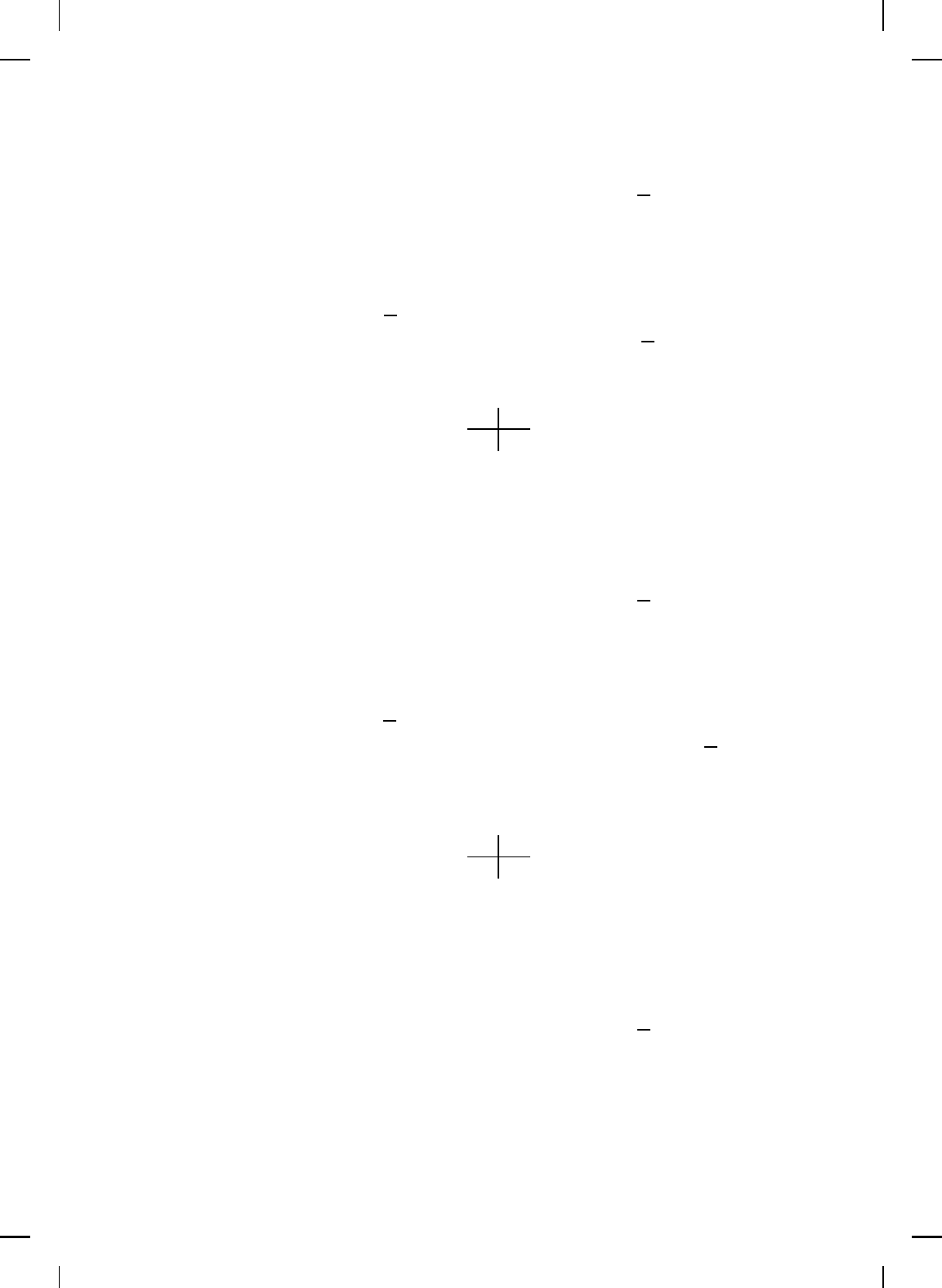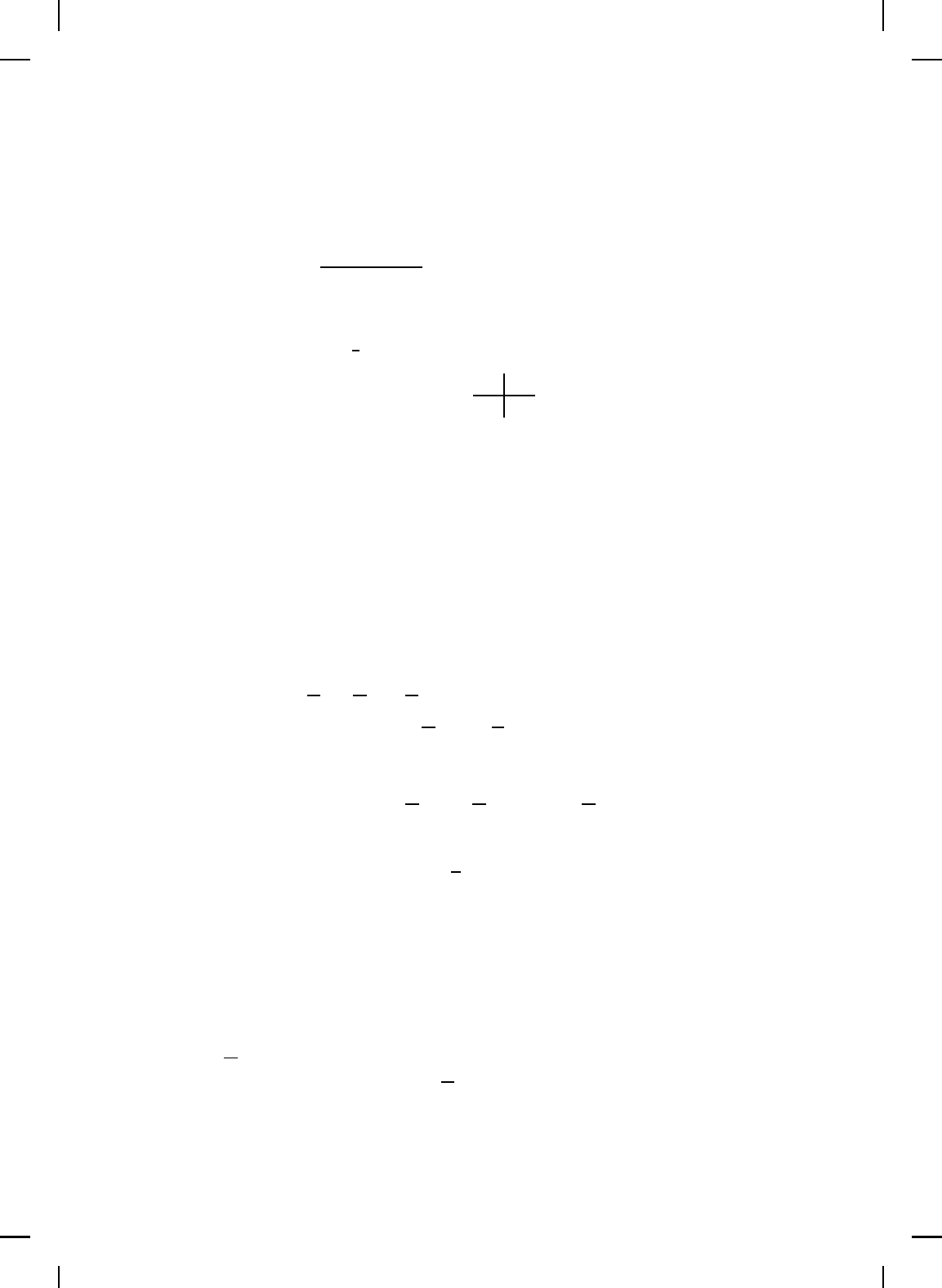Haddad W.M. Nonlinear Dynamical Systems and Control: A Lyapunov-Based Approach
Подождите немного. Документ загружается.


NonlinearBook10pt November 20, 2007
DISCRETE-TIME THEORY 835
where R ∈ R
n×n
is a positive-definite matrix. Furthermore, s how if A is
asymptotically stable, then P is the u nique solution to (13.244) and is given
by
P =
∞
X
k=0
A
kT
RA
k
. (13.245)
Problem 13.5. Consider the dynamical s ys tem (13.1) with f (x) =
Ax, where A ∈ R
n×n
Let R = C
T
C, where C ∈ R
l×n
, and assume
(A, C) is obs ervable. Show if there exists a positive-definite matrix P ∈
R
n×n
satisfying the discrete-time Lyapunov equation (13.244), then A is
asymptotically stable.
Problem 13.6. Let D
0
⊂ D be a compact positively invariant set
for the nonlinear dynamical system (13.1). Show that if there exists a
continuous function V : D → R such that
V (x) = 0, x ∈ D
0
, (13.246)
V (x) > 0, x ∈ D, x 6∈ D
0
, (13.247)
V (f (x)) −V (x) ≤ 0, x ∈ D, (13.248)
then D
0
is Lyapunov stable (see Section 4.9). If, in addition,
V (f (x)) −V (x) < 0, x ∈ D, x 6∈ D
0
, (13.249)
show that D
0
is asymptotically stable (see Section 4.9). Finally, if D = R
n
and V (x) → ∞ as kxk → ∞ show th at D
0
is globally asymptotically stable
(see Section 4.9).
Problem 13.7. Consider the nonlinear dynamical s ystem (13.1) and
recall the definition of a semistable equilibrium point x ∈ D (see Problem
3.44). Suppose the orbit O
x
of (13.1) is bounded for all x ∈ D and assume
that there exists a continuous function V : D → R such that
V (f (x)) −V (x) ≤ 0, x ∈ D. (13.250)
Furth ermore, let M denote the largest invariant set contained in R
△
=
{x ∈ D : V (f(x)) − V (x) = 0}. Show that if M ⊆ {x ∈ D : f (x) =
x and x is Lyapunov stable}, then (13.1) is semistable.
Problem 13.8. Consider the dyn amical system (13.1) with f (x) = Ax,
where A ∈ R
n×n
. Using the results of Problem 13.7 show that the following
statements are equ ivalent:
i) The zero solution x(k) ≡ 0 to (13.1) is semistable.
ii) For every initial condition x
0
∈ R
n
, lim
k→∞
x(k) exists.

NonlinearBook10pt November 20, 2007
836 CHAPTER 13
iii) If λ ∈ spec(A), th en either |λ| < 1, or both λ = 1 and λ is semisimple.
iv) lim
k→∞
A
k
exists.
Problem 13.9. Consider the dynamical system (13.1) with f(x) = Ax,
where A ∈ R
n×n
. Show that if there exist n ×n matrices P ≥ 0 and R ≥ 0
such that
P = A
T
P A + R, (13.251)
N
R
R(A −I
n
)
.
.
.
R(A −I
n
)
n−1
= N(A −I
n
), (13.252)
then the zero solution x(t) ≡ 0 to (13.1) is semistable (see Problem 13.8).
(Hint: First show that N(P ) ⊆ N(A −I
n
) ⊆ N(R) and N(A −I
n
) ∩R(A −
I
n
) = {0}.)
Problem 13.10 (Lyapunov’s Indirect Method). Let x(k) ≡ 0 be an
equilibrium point f or the nonlinear dynamical system
x(k + 1) = f (x(k)), x(0) = x
0
, k ∈ Z
+
, (13.253)
where f : D → D is continuously differentiable and D is an open set with
0 ∈ D. Furthermore, let
A =
∂f
∂x
(x)
x=0
.
Show that:
i) I f |λ| < 1, where λ ∈ spec(A), then the origin of the nonlinear
dynamical system (13.253) is asymptotically stable.
ii) If there exists λ ∈ spec(A) such that |λ| > 1, where λ ∈ spec(A), then
the origin of the nonlinear dynamical system (13.253) is unstable.
Problem 13.11. Let A ∈ R
n×n
. A is nonnegative if A
(i,j)
≥ 0, i, j =
1, . . . , n. Consider the dynamical system (13.1) with f (x) = Ax, where
A ∈ R
n×n
. Show that R
n
+
is an invariant set with respect to (13.1) if and
only if A is nonnegative.
Problem 13.12. Consider the nonlinear dynamical system
x
1
(k + 1) =
αx
2
(k)
1 + x
2
1
(k)
, x
1
(0) = x
10
, k ∈ Z
+
, (13.254)
x
2
(k + 1) =
βx
1
(k)
1 + x
2
2
(k)
, x
2
(0) = x
20
. (13.255)

NonlinearBook10pt November 20, 2007
DISCRETE-TIME THEORY 837
Analyze th e stability of the zero solution (x
1
(k), x
2
(k)) ≡ (0, 0) to (13.254)
and (13.255) using the Lyapunov function candidate V (x
1
, x
2
) = x
2
1
+ x
2
2
for
i) α
2
< 1 and β
2
< 1, ii) α
2
≤ 1, β
2
≤ 1, and α
2
+ β
2
< 2, iii) α
2
= β
2
= 1,
and iv) α
2
> 1 and β
2
> 1.
Problem 13.13. The nonlinear dynamical system (13.1) is nonneg-
ative if for every x(0) ∈ R
n
+
, the solution x(k), k ∈ Z
+
, to (13.1) is
nonnegative, that is, x(k) ≥≥ 0, k ∈ Z
+
. The equilibrium solution x(k) ≡ x
e
of the nonnegative dynamical system (13.1) is Lyapunov stable if for every
ε > 0 there exists δ = δ(ε) > 0 such that if x
0
∈ B
δ
(x
e
) ∩ R
n
+
, then
x(k) ∈ B
ε
(x
e
) ∩ R
n
+
, k ∈ Z
+
. The equilibrium solution x(k) ≡ x
e
of
the nonnegative dynamical system (13.1) is asymptotically stable if it is
Lyapunov stable and there exists δ > 0 such that if x
0
∈ B
δ
(x
e
) ∩R
n
+
, then
lim
k→∞
x(k) = x
e
. Consider the dynamical system (13.1) with f (x) = Ax,
where A ∈ R
n×n
is n on negative (see Pr ob lem 13.11). Show that the following
statements hold:
i) I f there exist vectors p, r ∈ R
n
such that p >> 0 and r ≥≥ 0 satisfy
p = A
T
p + r, (13.256)
then A is Lyapunov stable.
ii) If there exist vectors p, r ∈ R
n
such that p ≥≥ 0 and r ≥≥ 0
satisfy (13.256) and (A, r
T
) is observable, then p >> 0 and A is
asymptotically stable.
Furth ermore, show that the f ollowing statements are equ ivalent:
iii) A is asymptotically stable.
iv) There exist vectors p, r ∈ R
n
such that p >> 0 and r >> 0 satisfy
(13.256).
v) There exist vectors p, r ∈ R
n
such that p ≥≥ 0 and r >> 0 satisfy
(13.256).
vi) For every r ∈ R
n
such that r >> 0, there exists p ∈ R
n
such that
p >> 0 satisfies (13.256).
(Hint: Use the Lyapunov function candidate V (x) = p
T
x in your analysis
and show that the Lyapunov stability theorems of Section 13.2 and th e
invariant set theorem of Section 13.3 can be used dir ectly for nonnegative
systems with the required s ufficient conditions verified in R
n
+
.)

NonlinearBook10pt November 20, 2007
838 CHAPTER 13
Problem 13.14. Prove Lemma 13.2.
Problem 13.15. Prove Theorem 13.22.
Problem 13.16. Prove Theorem 13.25.
Problem 13.17. Let f = [f
1
, . . . , f
n
]
T
: D → D, where D is an open
subset of R
n
that contains R
n
+
. Then f is nonnegative if f
i
(x) ≥ 0, for all
i = 1, . . . , n, and x ∈ R
n
+
. Consider the nonlinear dynamical system (13.1).
Show that th e following statements hold:
i) Suppose R
n
+
⊂ D. Then R
n
+
is an invariant set with respect to (13.1)
if and only if f : D → D is nonnegative.
ii) Suppose f(0) = 0 and f : D → D is nonnegative and continuously
differentiable on R
n
+
. Then A
△
=
∂f
∂x
(x)
x=0
is nonnegative (see Problem
13.11).
iii) If f (x) = Ax, where A ∈ R
n×n
, then f is nonnegative if and only if A
is nonnegative.
Problem 13.18. Consider a discrete epidemic model involving two
distinct populations where infected members of one population can trans mit
a disease to a sus ceptible in the other population. Letting x
i
denote the
infected fraction of the ith population and (1 − x
i
) denote the fraction of
susceptibles, the epidemic model can be characterized as
x
1
(k + 1) = a
1
x
2
(k)[1 −x
1
(k)] + (1 −b
1
)x
1
(k), x
1
(0) = x
10
, k ∈ Z
+
,
(13.257)
x
2
(k + 1) = a
2
x
1
(k)[1 −x
2
(k)] + (1 −b
2
)x
2
(k), x
2
(0) = x
20
, (13.258)
where a
i
∈ (0, 1) and b
i
∈ (0, 1) for i = 1, 2. C haracterize all the equilibria of
(13.257) and (13.258). Using the Lyapunov function candidate V (x) = p
T
x,
where x = [x
1
, x
2
]
T
and p ∈ R
2
+
, analyze the stability of the equilibria
of (13.257) and (13.258). Make sure to justify that V (x) = p
T
x is a valid
Lyapunov function. (Hint: See Problem 13.17.)
Problem 13. 19. The nonlinear dynamical system G given by (13.135)
and (13.136) is nonnegative if for every x(0) ∈ R
n
+
and u(k) ≥≥ 0, k ∈ Z
+
,
the solution x(k), k ∈ Z
+
, to (13.100) and the output y(k), k ∈ Z
+
, are
nonnegative, that is, x(k) ≥≥ 0, k ∈ Z
+
, and y(k) ≥≥ 0, k ∈ Z
+
. Consider
the nonlinear dynamical system G given by (13.135) and (13.136). Show th at
if f : D → R
n
is nonnegative (see Problem 13.17), G(x) ≥≥ 0, h(x) ≥≥ 0,
and J(x) ≥≥ 0, x ∈ R
n
+
, then G is nonnegative.

NonlinearBook10pt November 20, 2007
DISCRETE-TIME THEORY 839
Problem 13.20. Let q ∈ R
l
and r ∈ R
m
. Consider the nonlinear
nonnegative dynamical system G (see P roblem 13.19) given by (13.135) and
(13.136) where f : D → R
n
is nonnegative (see Problem 13.17), G(x) ≥≥ 0,
h(x) ≥≥ 0, and J(x) ≥≥ 0, x ∈ R
n
+
. Show that if there exist functions
V
s
: R
n
+
→ R
+
, ℓ : R
n
+
→ R
+
, W : R
n
+
→ R
m
+
, P
1u
: R
n
→ R
1×m
, and a scalar
ρ > 1 (respectively, ρ = 1) such that V
s
(·) is continuous and nonnegative
definite, V
s
(0) = 0,
V
s
(f(x) + G(x)u) = V
s
(f(x)) + P
1u
(x)u, x ∈ R
n
+
, u ∈ R
m
+
, (13.259)
and, for all x ∈ R
n
+
,
0 = V
s
(f(x)) −
1
ρ
V
s
(x) − q
T
h(x) + ℓ(x), (13.260)
0 = P
1u
(x) − q
T
J(x) −r
T
+ W
T
(x), (13.261)
then G is geometrically d issipative (respectively, dissipative) w ith respect to
the supply rate s(u, y) = q
T
y + r
T
u. (Hint: The definition of dissipativity
and geometric d issipativity should be modified to reflect the fact that x
0
∈
R
n
+
, and u(k), k ∈ Z
+
, and y(k), k ∈ Z
+
, are nonnegative.)
Problem 13.21. Let q ∈ R
l
and r ∈ R
m
. Consider the nonlinear
nonnegative dynamical system G (see P roblem 13.19) given by (13.135) and
(13.136) where f : D → R
n
is nonnegative (see Problem 13.17), G(x) ≥≥ 0,
h(x) ≥≥ 0, and J(x) ≥≥ 0, x ∈ R
n
+
. Show that G is lossless with respect
to the supply rate s(u, y) = q
T
y + r
T
u , u ∈ R
m
+
, if and only if there exist
functions V
s
: R
n
+
→ R
+
and P
1u
: R
n
→ R
1×m
such that V
s
(·) is continuous,
V
s
(0) = 0, and for all x ∈ R
n
+
, (13.259) holds and
0 = V
s
(f(x)) −V
s
(x) − q
T
h(x), (13.262)
0 = P
1u
(x) − q
T
J(x) − r
T
. (13.263)
If, in addition, V
s
(·) is continuously differentiable sh ow that
P
1u
(x) = V
′
s
(f(x))G(x). (13.264)
Problem 13.22. Let q ∈ R
l
and r ∈ R
m
and assum e G given by
(13.135) and (13.136) is such that f : D → R
n
is nonnegative (see Problem
13.17), G(x) ≥≥ 0, h(x) ≥≥ 0, and J(x) ≥≥ 0, x ∈ R
n
+
. Suppose G
is geometrically dissipative (respectively, dissipative) with respect to the
supply rate s(u, y) = q
T
y + r
T
u. Show th at there exist p ∈ R
n
+
, l ∈ R
n
+
, and
w ∈ R
m
+
and a scalar ρ > 1 (respectively, ρ = 1) such that
0 = A
T
p −
1
ρ
p − C
T
q + l, (13.265)
0 = B
T
p − D
T
q − r + w, (13.266)

NonlinearBook10pt November 20, 2007
840 CHAPTER 13
where
A =
∂f
∂x
x=0
, B = G(0), C =
∂h
∂x
x=0
, D = J(0). (13.267)
If, in addition, (A, C) is observable, show that p >> 0.
Problem 13.23. Let q ∈ R
l
and r ∈ R
m
. Consider the nonnegative
dynamical system G given by (13.198) an d (13.199) where A ≥≥ 0, B ≥≥ 0,
C ≥≥ 0, and D ≥≥ 0. Show that G is geometrically dissipative (respectively,
dissipative) with respect to the supply rate s(u, y) = q
T
y + r
T
u if and only
if there exist p ∈ R
n
+
, l ∈ R
n
+
, and w ∈ R
m
+
, and a scalar ρ > 1 (respectively,
ρ = 1) such that
0 = A
T
p −
1
ρ
p − C
T
q + l, (13.268)
0 = B
T
p − D
T
q − r + w. (13.269)
(Hint: Use Problems 13.21 and 13.22 to show the result.)
Problem 13.24 (Parseval’s Theorem). Let u : Z
+
→ R
m
and
y : Z
+
→ R
l
be in ℓ
p
, p ∈ [0, ∞), and let u(z) and y(z) denote their Z-
transforms, respectively. Show that
∞
X
k=0
u
T
(k)y(k) =
1
2π
Z
π
−π
u
∗
(e
θ
)y(e
θ
)dθ. (13.270)
Problem 13.25 (Positivity Theorem). Consider the controllable and
observable system
x(k + 1) = Ax(k) + Bu(k), x(0) = x
0
, k ∈ Z
+
, (13.271)
y(k) = Cx(k) + Du(k), (13.272)
u(k) = −σ(y(k), k), (13.273)
where x ∈ R
n
, u, y ∈ R
m
, and
σ(·, ·) ∈ Φ
pr
△
= {σ : R
m
×Z
+
→ R
m
: σ(0, ·) = 0,
σ
T
(y, k)y ≥ 0, y ∈ R
m
, k ∈ Z
+
}.
Furth ermore, suppose
G(z) ∼
A B
C D
is strictly positive real. Show that the negative feedb ack interconnection of
(13.271)–(13.273) is globally uniform ly asymptotically stable for all σ(·, ·) ∈
Φ
pr
.
Problem 13.26 (Small Gain Theorem). Consider the controllable and

NonlinearBook10pt November 20, 2007
DISCRETE-TIME THEORY 841
observable system
x(k + 1) = Ax(k) + Bu(k), x(0) = x
0
, k ∈ Z
+
, (13.274)
y(k) = Cx(k) + Du(k), (13.275)
u(k) = σ(y(k), k), (13.276)
where x ∈ R
n
, u ∈ R
m
, y ∈ R
l
, and
σ(·, ·) ∈ Φ
br
△
= {σ : R
l
× Z
+
→ R
m
: σ(0, ·) = 0, kσ(y, k)k
2
≤ γ
−1
kyk
2
,
y ∈ R
m
, k ∈ Z
+
},
and where γ > 0. Furthermore, suppose
G(z) ∼
A B
C D
is strictly positive real. Show that the negative feedb ack interconnection of
(13.274)–(13.276) is globally uniform ly asymptotically stable for all σ(·, ·) ∈
Φ
br
.
Problem 13.27 (Circle Criterion). Consider the controllable and
observable system
x(k + 1) = Ax(k) + Bu(k), x(0) = x
0
, k ∈ Z
+
, (13.277)
y(k) = Cx(k) + Du(k), (13.278)
u(k) = −σ(y(k), k), (13.279)
where x ∈ R
n
, u ∈ R
m
, y ∈ R
l
, and
σ(·, ·) ∈ Φ
c
△
= {σ : R
l
× Z
+
→ R
m
: σ(0, ·) = 0,
[σ(y, k) − M
1
y]
T
[σ(y, k) − M
2
y] ≤ 0, y ∈ R
m
, k ∈ Z
+
},
and where M
1
, M
2
∈ R
m×l
. Furthermore, suppose [I + M
2
G(z)][I +
M
1
G(z)]
−1
is strictly positive real, where
G(z) ∼
A B
C D
and det[I + M
1
G(x)] 6= 0, |z| ≥ 1. Show that the negative feedback
interconnection of (13.277)–(13.279) is globally uniformly asymptotically
stable for all σ(·, ·) ∈ Φ
c
.
Problem 13.28 (Szeg¨o Criterion). Consider the controllable and
observable system
x(k + 1) = Ax(k) + Bu(k), x(0) = x
0
, k ∈ Z
+
, (13.280)
y(k) = Cx(k), (13.281)
u(k) = −σ(y(k)), (13.282)

NonlinearBook10pt November 20, 2007
842 CHAPTER 13
where x ∈ R
n
, u, y ∈ R
m
, and
σ(·) ∈ Φ
S
△
= {σ : R
m
→ R
m
: σ(0) = 0, σ
T
(y)[M
−1
σ(y) − y] ≤ 0, y ∈ R
m
,
σ(y) = [σ
1
(y
1
), σ
2
(y
2
), . . . , σ
m
(y
m
)]
T
, and
0 <
σ
i
(ν) − σ
i
(ˆν)
ν − ˆν
< µ
i
, ν, ˆν ∈ R, i = 1, . . . , m},
and where M ∈ R
m×m
is a positive-definite matrix and ν 6= ˆν. Furthermore,
suppose there exists a positive-definite diagonal matrix N such that M
−1
+
[I + (z − 1)N]G(z) −
1
2
|z − 1|
2
G
∗
(z)µNG(z) is strictly positive real, where
G(z) ∼
A B
C 0
and µ = diag[µ
1
, µ
2
, . . . , µ
m
]. Show th at the n egative feedback interconnec-
tion (13.280)–(13.282) is globally asymptotically stable for all σ(·) ∈ Φ
S
.
Problem 13.29. Show that the results of Problems 6.4–6.6 also hold
in the case where G
1
and G
2
are d iscrete-time dynamical systems.
Problem 13.30. Consider the nonnegative dynamical system G (see
Problem 13.19) given by (13.198) and (13.199), and assume that (A, C) is
observable and G is geometrically dissipative with respect to the supply
rate s(u, y) = e
T
u − e
T
My, where M >> 0. Show that the positive
feedback interconnection of G and σ(·, ·) is globally asymptotically stable
for all σ(·, ·) ∈ Φ, where
Φ
△
= {σ : Z
+
× R
l
+
→ R
m
+
: σ(·, 0) = 0, 0 ≤≤ σ(k, y) ≤≤ My,
y ∈ R
l
+
, k ∈ Z
+
}, (13.283)
M >> 0, and M ∈ R
m×l
. (Hint: Use Problem 13.23 to show that if G is
geometrically dissipative with respect to the supply rate s(u, y) = e
T
u −
e
T
My, then there exist p ∈ R
n
+
, l ∈ R
n
+
, and w ∈ R
m
+
, and a scalar ρ > 1
such that
0 = A
T
p −
1
ρ
p + C
T
M
T
e + l, (13.284)
0 = B
T
p + D
T
M
T
e − e + w. (13.285)
Now, use the Lyapunov function candidate V (x) = p
T
x.)
Problem 13.31. Let q ∈ R
l
, r ∈ R
m
, q
c
∈ R
l
c
, and r
c
∈ R
m
c
. Consider
the nonlinear nonnegative dynamical s ystems G and G
c
(see Prob lem 13.19)
given by (13.135) and (13.136), and (13.225) and (13.226), respectively,
where f : D → R
n
is nonnegative, G(x) ≥≥ 0, h(x) ≥≥ 0, J(x) ≥≥ 0,
x ∈ R
n
+
, f
c
: R
n
c
→ R
n
c
is nonnegative, G
c
(u
c
, x
c
) = G
c
(x
c
) ≥≥ 0,
h
c
(u
c
, x
c
) = h
c
(x
c
) ≥≥ 0, x
c
∈ R
n
c
+
, and J
c
(u
c
, x
c
) ≡ 0. Assume that G

NonlinearBook10pt November 20, 2007
DISCRETE-TIME THEORY 843
is dissipative with respect to the linear supply rate s(u, y) = q
T
y + r
T
u and
with a continuous positive-definite storage function V
s
(·), and assume that G
c
is dissipative with respect to the linear supply rate s
c
(u
c
, y
c
) = q
T
c
y
c
+ r
T
c
u
c
and with a continuous positive-definite storage function V
sc
(·). Show that
the f ollowing statements hold:
i) I f there exists a scalar σ > 0 s uch that q + σr
c
≤≤ 0 and r +σq
c
≤≤ 0,
then the positive feedback interconnection of G and G
c
is Lyapunov
stable.
ii) If G and G
c
are zero-state observable and there exists a scalar σ > 0
such that q + σr
c
<< 0 and r + σq
c
<< 0, then the positive feedback
interconnection of G and G
c
is asymptotically stable.
iii) If G is zero-state ob s ervable, rank G
c
(0) = m
c
, G
c
is geometrically
dissipative with respect to the supply rate s
c
(u
c
, y
c
) = q
T
c
y
c
+ r
T
c
u
c
,
and there exists a scalar σ > 0 such that q + σr
c
≤≤ 0 and r +
σq
c
≤≤ 0, then the positive feedback interconnection of G and G
c
is
asymptotically stable.
iv) If G is geometrically dissipative with respect to the sup ply r ate
s(u, y) = q
T
y + r
T
u, G
c
is geometrically dissipative with respect to
the s upply rate s
c
(u
c
, y
c
) = q
T
c
y
c
+ r
T
c
u
c
, and there exists a scalar
σ > 0 such that q + σr
c
≤≤ 0 and r + σq
c
≤≤ 0, then the positive
feedback interconnection of G and G
c
is asymptotically stable.
(Hint: First show that the positive feedback interconnection of G and G
c
gives a nonnegative closed-loop system.)
13.17 Notes and References
In comparison to the stability theory of continuous-time dynamical systems,
there is very little literature on the stability theory of discrete-time systems.
This is due to the fact that discrete-time stability theory very closely
parallels continuous-time stability theory and is often p resented as a footnote
to the continuous-time theory. Among the earliest pap ers on discrete-
time stability theory is due to Li [276]. A self-contained summary of
the application of Lyapunov stability theory to discrete-time systems is
given by Hahn [177]. See also Kalman and Bertram [229]. The invariance
principle and the invariant set theorems for discrete-time systems is due
to LaSalle; see for example [259]. Nonlinear discrete-time extensions
of passivity and losslessness are du e to Byrnes and Lin [78] and Lin
and Byrnes [281, 282]. Extended Kalman-Yakubovich-Popov equations for
nonlinear discrete-time dissipative systems are given in Chellaboina and

NonlinearBook10pt November 20, 2007
844 CHAPTER 13
Haddad [86]. The concepts of geometric dissipativity, geometric passivity,
and geometric non exp ansivity are a discrete-time analog of exponential
dissipativity introd uced by Chellab oina and Haddad [88] f or continuous-
time systems. Th e discrete-time positive real and bounded real lemmas
for single-input, single-output s ystems are due to Szeg¨o and Kalman [422]
and Szeg¨o [421], respectively. Multivariable generalizations are given in Hitz
and Anderson [197] an d Vaidyanathan [437]. A textbook treatment of linear
discrete-time passivity is given by Cains [80].
Gain, sector, and d isk margins for nonlinear discrete-time systems are
due to Chellaboina and Haddad [86] and can be viewed as a generalization
of the work by Lee and Lee [262] on gain and phase margins for d iscrete-
time linear systems. Finally, the concept of discrete-time control Lyapunov
functions introduced in this chapter is a generalization of the single-input,
discrete-time control Lyapunov function introduced by Amicucci, Monaco,
and Normand-Cyrot [6] to multi-inp ut systems.
